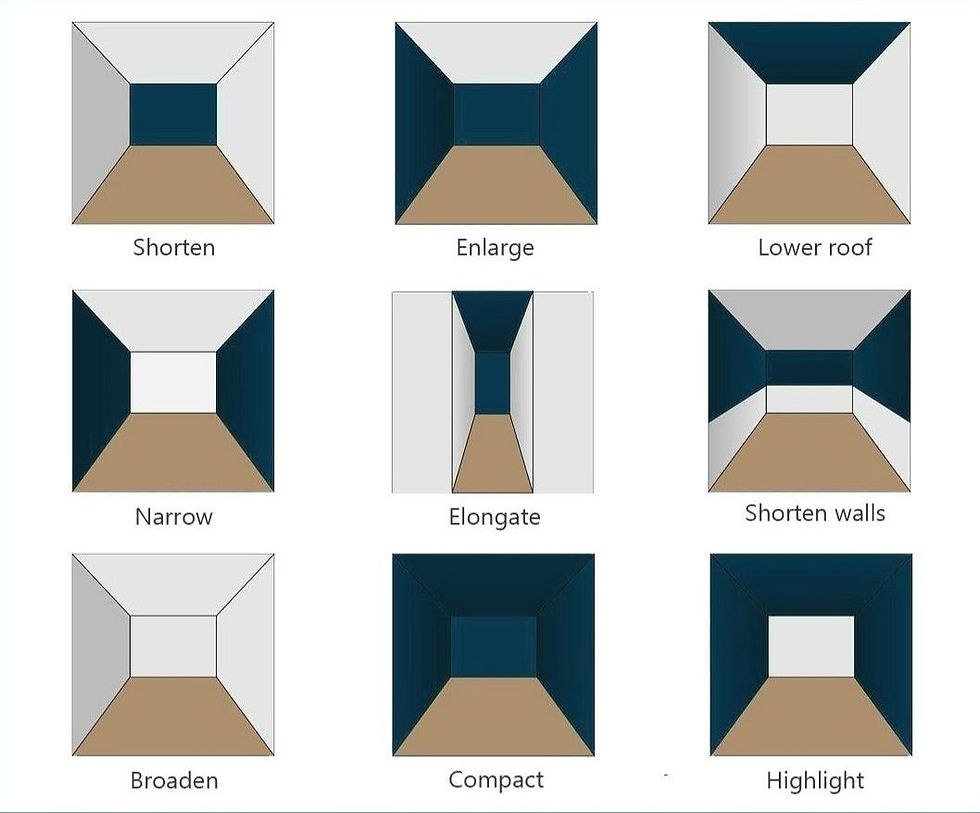Using Paint and Wallpaper Colour and Placement to Change Room Depth
- Andrea Guidera
- Mar 29
- 3 min read
Interior design has a unique power to change how we feel in a space. The role of coulor is often highlighted, but the way we paint walls and ceilings can significantly affect the perception of a room. By using colour strategically, you can create an inviting atmosphere that enhances your living space. Whether you are a design novice or a seasoned decorator, knowing how to utilise color and placement for depth and perception is crucial for an impressive makeover.
The following graphic shows how different colour placement affects depth and perception.

The Basics of Color Theory
Understanding color theory is foundational to creating harmonious spaces. Colors fall into three primary categories: warm, cool, and neutral shades.
Warm colours: Reds and oranges evoke feelings of excitement and energy. For example, a bold red accent wall can spark enthusiasm in a dining area.
Cool colours: Blues and greens promote relaxation. A soothing pale blue in a bedroom can make the space feel more tranquil.
Neutral colours: Greys, whites, and beiges offer flexibility and balance. They can connect bright colors and serve as a backdrop for various decorating styles.
Using these colours thoughtfully leads to well-designed interiors that reflect personal style while feeling comfortable.

Using Colour to Create Depth
To enhance the feeling of depth within a room, the contrast of colours plays a vital role. For instance, light colours on the walls can make an area seem more spacious, while darker shades can create an intimate atmosphere. In a room with a low ceiling, paint it a light colour, such as soft white or pale yellow, which provides an airy feel. If you have a large living room, painting the walls a rich navy blue can offer a cozy environment perfect for gatherings.
Adding an accent wall is another effective technique. For example, if the rest of the dining room is painted in soft beige, a deep forest green accent wall can create a focal point that draws attention, making the space feel warmer and more inviting.

The Influence of Ceilings
Ceilings often receive little attention, yet their colour can alter a room's entire vibe. A bright white ceiling can open up a small bathroom, creating a feeling of height and light. If you have a larger room, consider painting the ceiling a darker shade—think midnight blue—which can give it a sophisticated and grounded feel.
Don't hesitate to experiment with bold colours. A charcoal ceiling can make your dining room appear more cozy and luxurious, especially when paired with warm lighting.

The Power of Vertical Lines
Vertical lines can create a more expansive feel in a room. Incorporating vertical stripes in your paint design can enhance the illusion of height. For instance, painting the lower half of the walls in a darker shade like deep teal and the upper half in a lighter hue, such as pale grey, can visually stretch the room.
This technique is especially effective in spaces like narrow hallways, where the height can be emphasized, making them feel more welcoming.

Incorporating Patterns
Patterns can add depth and interest without overwhelming a room. Consider using wallpaper with simple geometric shapes to enhance the area. For instance, a light grey wallpaper with small white triangles can create a fascinating backdrop for solid paint colors, enriching the space visually.
This technique works well in more relaxed areas, like a family room or playroom, where a casual, welcoming vibe is desired.

The Role of Lighting
Do not forget the role of lighting. Lighting significantly influences how colours are perceived. Natural sunlight can intensify colours, while artificial light may soften them. For example, north-facing rooms often benefit from warmer colours like soft peach or buttery yellow to counterbalance the cooler light they receive.
Be mindful of how different times of the day impact the look of your colours. Taking a moment each day to observe how the changing sunlight interacts with your walls can guide you on the best shades for your space.
Creating Inviting Spaces
Revamping a room with paint is about more than just colour choice; it is also about recognising how that colour interacts with the space itself, the light, and the furniture around it. Thoughtful colour choices can lead to transformative environments, allowing you to create a home that is not only stylish but also inviting.
As you plan your next decorating project, remember to focus on the perception of depth and the overall feel of your spaces. With the right colours and techniques, you can achieve a fresh and exciting makeover that reflects your unique personality.

Comments